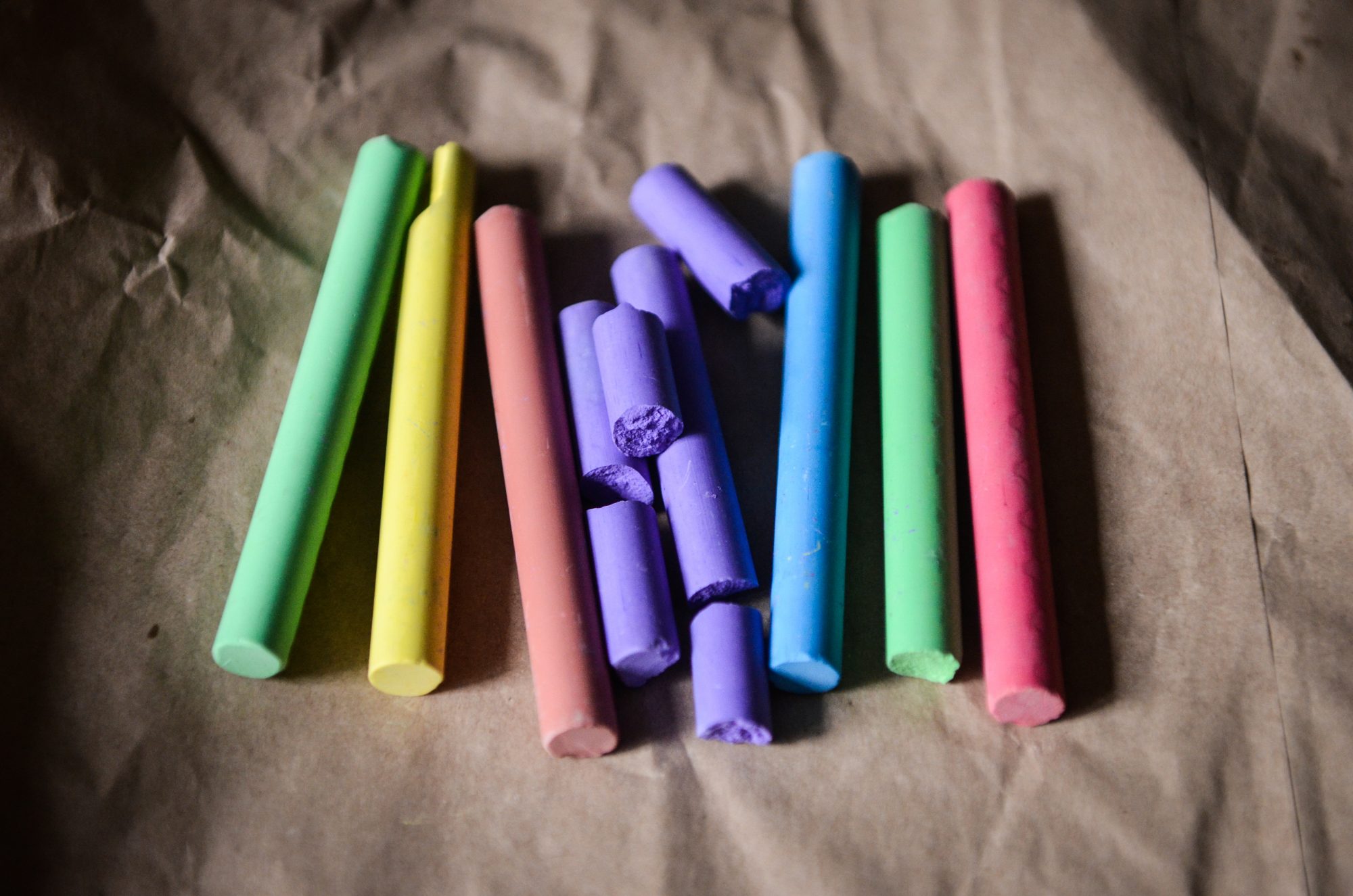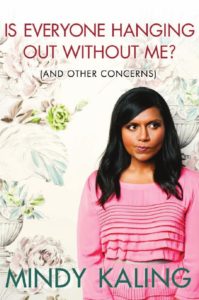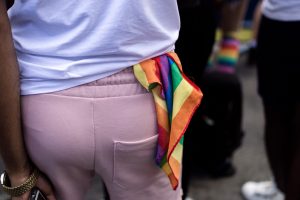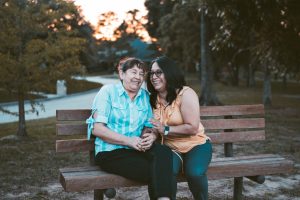I posted this after the release of Love, Simon, the mainstream movie about a gay teen whose main character is brought to life by a young man who has no idea what it is like to actually be a gay teen. And boy did it start some drama. I was even called homophobic over it. While I’m happy the movie was made, and enjoy seeing an increase in queer characters in film, I cannot help but notice a lack of real people being represented.[note]Yes, one of the actors came out after the movie was released. And while I applaud him for being true to himself, it must be noted that he was cast while identifying as straight.[/note]
At the end of the day, movies and TV shows with queer characters are nothing more than fiction. Stories made up, mostly by straight people, and portrayed by actors, mostly straight. We’ve seen an increase in non-white representation in media thanks to the continued work of those calling out the whitewashing in the industry.[note]Characters not typically white being portrayed by white actors.[/note]
It’s time the queer community stand up and demand we stop being straightwashed.
There are three main reasons straightwashing is such a big problem.
When movies cast straight actors to play queer characters we’re being told-
1. Our straight friends are better than us, even at being queer.
2. We don’t get to be a part of our own story and history.
3. Our own struggles aren’t important because there is a straight actor who can convincingly enough pretend to go through it.
This perpetuates the destructive narrative that being queer is somehow undesirable. less than. invisible.[note]or at least should be invisible.[/note]
And it’s more prevalent than just Love, Simon. For as much as the entertainment industry loves to capitalize on queer people and bculture, there is still rampant homophobia. We’ll start with the obvious.

Remember this scene from The Force Awakens? Disney had the perfect opportunity to create a queer relationship in the Star Wars canon. And Twitter was HERE. FOR. IT. And honestly, so was the rest of the internet.[note]https://www.buzzfeed.com/krishrach/the-internet-has-decided-on-its-favourite-force-awakens-coup?utm_term=.suww50nqPM#.aaqW8PNyOJ[/note] Even actors and directors were approving the romance between the two characters. But Disney giveth, and Disney taketh away, and in the sequel we got a forced romance between Finn and someone who isn’t Poe or even Rey that nobody asked for.
Beyond Star Wars squandering opportunities given to us by them themselves, we have comic book adaptations writing out canonically queer characters.[note]https://www.buzzfeed.com/shannonkeating/queer-female-characters-keep-dying-in-superhero-movies?utm_term=.asOV0YZe3M#.keDpo5X2MZ[/note]Wonder Woman, Thor: Ragnarok, and Black Panther are all phenomenal movies that broke records, boundaries, and glass ceilings. They also, however, broke their queer roots.
Wonder Woman is canonically bisexual. But in the writing for the movie “was never even brought to the table.” In Thor, Valkyrie is written as bisexual in the comics. The actress did note that she portrayed the character that way, and the director agreed to include a shot of another woman walking out of her bedroom to portray this sexuality, but it was cut. Even so, that does very little to show this character’s sexuality. And while not necessarily canonical, many of the women in Black Panther are widely regarded as queer because of a spinoff series portraying them as such. And yet, its nowhere to be found in the movie.
What do we get instead? Three incredibly similar death scenes where one woman is clearly devastated by the death of another. Many have dubbed this queerbaiting– creating just enough of a queer moment to allow us to “read between the lines”[note]or “see the coding”[/note] of the moment and assume it’s queer, without actually saying anything.
Queerbaiting is something that Disney is notorious for. Sometimes they go beyond the coding and actually introduce something queer, but it’s never anything significant. From the Beauty and the Beast “gay moment” that turned out to be nothing more than a 2-second dance between two men[note]https://www.usatoday.com/story/life/entertainthis/2017/03/20/beauty-and-the-beast-gay-moment-audience-reaction/99407168/[/note], to the first openly gay character on Disney Channel whose sexuality is referenced only two times in all 13 episodes of season two, both of which end within 30 seconds, to the quick shots of queer couples kissing in Star Vs. The Forces of Evil, to episodes with two moms in other shows. They make big headlines with “first gay this” and “first gay that” for Disney, but none of it has much significance to the show or movie. We’ve been queerbaited. Again.
But this whole discussion started because of queer characters not being played by queer people. Surely this isn’t a widespread problem. Quite a few movies recently have celebrated queerness with portrayals of queer characters who are well defined, and their queerness is a vital aspect of their character. How is that homophobic?
Hollywood has a long history of straightwashing queer characters with straight actors, much like they’ve been guilty of whitewashing characters. We see it in Love, Simon, we saw it in Call Me By Your Name, and we saw it years ago in Brokeback Mountain, The Kids are All Right, and I Love You Phillip Morris, etc. But it’s even a problem in the arguably more queer-friendly world of TV.
I’m in a facebook group for queer people of faith, and there was recently a poll conducted asking the group for their favorite tv shows with queer representation. Over 80 shows were submitted. I have here the top ten.

You would think that these shows would cast queer people to play queer characters, especially since many are centered around queer characters, right? Let’s find out. And to be generous, I’ll allow for a show to have 50% of their queer characters portrayed by queer individuals.
Queer Eye is an obvious outlier in that it is a reality show, and the queer people represent themselves. So we have 1–0.
Next up we have Brooklyn Nine-Nine((This show appeared later on the list with the name fully spelled out, so it could be considered number one)). This show features three queer characters, only one of whom is bisexual in real life.1This show does not pass 50%, so we’re 1–1
Fan favorite The Fosters, which literally centers on a two-mom family where one of the children is beginning to explore his sexuality at a young age, has 2 queer cast members. Out of 13 queer characters from across the spectrum, the only two who are queer in real life are trans men. The winner of a GLAAD media award in 2014 didn’t even cast queer people for its queer show.[note]http://variety.com/2014/tv/awards/the-fosters-behind-the-candelabra-among-glaad-media-awards-winners-1201156504/[/note] 1–2
Grace and Frankie, a show about two men who divorce their wives to be together, has neither character played by a queer man. Interestingly, one of the straight wives is played by a lesbian. But that’s not what we’re looking at here.1–3
Orange is the New Black 1–4
The Handmaid’s Tale 2–4
Doctor Who 2–5
Sense8 3–5[note]Most characters in this show engage in sex with pretty much everyone, but do not all identify as queer. Those who do are played by queer individuals.[/note]
Jane the Virgin 3–6
Unbreakable Kimmy Schmidt 3–7
Of the top ten queer representative shows, only 3 have at least 50% of their queer characters portrayed by people who identify as queer in real life.
While we’re on the subject of TV shows, let’s discuss the bullshit that is the treatment of Sense8 by Netflix. Arguably one of the queerest, and most diverse shows ever, Sense8 has a cult following, many of whom are queer. So what does Netflix do?
Following the release of a cliffhanger season, and on the first day of pride month, they canceled it. Understandably, the internet was enraged. Petitions were filed; boycotts were planned; letters were written. A few days later we were given a response. “Unfortunately we can’t” bring it back. [note]By the end of the month we did get a 2 hours series wrap-up ordered- https://www.vox.com/2017/6/29/15895156/sense8-canceled-netflix-new-special-2018, but it was too little too late for their image on the matter.[/note]
So what is the reason they couldn’t give us more? It cost too much. At approximately $9 million an episode, Netflix did not feel they could justify the expense.[note]https://variety.com/2017/tv/news/netflixs-ted-sarandos-1202461684/[/note] Because Netflix is strapped for cash, obviously this makes sense. Except, they’re not. They’re spending $8 BILLION on 700 original shows and movies.[note]http://variety.com/2018/digital/news/netflix-700-original-series-2018-1202711940/[/note] Even at 11 episodes per season, that is less than 2% of their original production budget. And there were ways to reduce the cost. They could film in studios rather than on location. They could re-write the show to be less grandiose. Those who loved the show would still watch it. Netflix chose not to.[note]This is not explicitly homophobic, but it does leave a sour taste in one’s mouth when its broken down in such a way.[/note]
Now, I’m sure many of you are wondering if it just is a coincidence that these things happen. Surely Hollywood can’t be that homophobic, right? Unfortunately, no.
Actors are frequently told not to come out from multiple fronts. Colton Haynes was told he shouldn’t come out by his management team cause it would cost his career.[note]http://www.nydailynews.com/entertainment/colton-haynes-told-wouldn-gay-actor-article-1.3244099)[/note] Other actors advise not coming out because the audience doesn’t need to know your personal life.[note]https://www.hollywoodreporter.com/news/matt-damon-gay-actors-closet-827767[/note] Conveniently, this actor is straight publicly, with kids, so it seems his advice about hiding one’s sexuality only applies to queer people. Isn’t that telling?
Once someone does come out, they’re pigeonholed, and seen only as able to play queer characters.[note]https://www.theguardian.com/film/2016/jan/27/ellen-page-hollywood-now-im-gay-i-cant-play-straight-perso[/note][note]http://www.newsweek.com/glee-sean-hayes-gay-actors-play-straight-70225[/note] Queer actors have been sidelined for straight roles, which is the very reason many of their agents have advised they not come out.[note]https://www.theguardian.com/world/2012/jan/26/gay-actors-coming-out-equity-survey[/note] But it’s brave and remarkable for a straight person to play a queer character on screen?
#OscarsSoWhite shone a light on a lack of ethnic and cultural diversity in Hollywood, and Ian McKellen firmly believes homophobia is just as big an issue, noting that no openly queer person has ever won an Oscar, but men have been awarded them for pretending to be queer.[note]https://www.theguardian.com/film/2016/jan/25/ian-mckellen-why-no-openly-gay-man-oscar-diversity-homophobia[/note]. In fact, McKellen is one of two out men who has even been nominated for an oscar, the other being Jaye Davidson. And only woman has- Angelina Jolie.[note]https://www.advocate.com/commentary/2017/2/24/moonlight-may-win-oscars-out-actors-still-lose[/note] Beyond that, most queer performers have heard homophobic remarks on set, and there is a strong preference for studios to try to market straight talent, because they don’t know how, and/or don’t want, to market queer talent.[note]https://www.theguardian.com/film/2017/oct/16/hollywood-hetero-approach-casting-gay-cinema[/note]
As much as we like to think of the entertainment industry has a haven for queer people, it’s not. It profits off us and our culture, but, at the end of the day, it doesn’t respect us as people. This is why queer representation matters. This is why queer characters need to be played by queer actors. We’re still fighting for acceptance, even in the more “tolerant” places of our society. It is not enough to accept half-assed representation by people who haven’t lived the life.
We need actual queer people representing us on film with their hearts; their souls; their struggles and triumphs
-To show to our up and coming queer family that we exist, we matter, and we’re worth representing ourselves.
-To show to our antagonists that we’re here, we’re queer, and we wouldn’t want to be anything else.
-To show ourselves that we aren’t alone (even when we feel like it) because others have gone before us, and others will come after us, and we’re all part of the same crazy, beautiful family.
Common Rebuttals
It may be acting, but some of these stories are the only experience young queer people have with other queer people. These stories may be made up, but they are presented because they will connect with someone. We deserve to have our stories told by and our connection to our community to be with people from our community.
We’ve all seen movies that cast people in terrible roles. Casting calls and auditions do not mean they picked the best person for a role. It simply means they picked someone for the role. There is no way there are not enough queer actors to play to the queer roles.
Well first, that’s part of the homophobia in Hollywood- feeling like queer people can’t play straight. So thank you for proving my point. And second, that’s like asking why we don’t have a straight pride month.
THEY. DONT. NEED. IT.
Straight people do not need the representation that queer people do, they’re everywhere. Queer people need representation by queer people, much like other minorities need representation of themselves. So yes, queer people can still play straight parts.
- Her character came out shortly after she did in real life. [↩]






One Response
Nick, this was such a compelling read. Queer people should be ‘central’ choice when it comes to telling the stories of other queer people (in reference to casting). I’ve been feeling recently that I am responsible for telling my own story—because it seems that only stories of white gay love are portrayed as palatable and wholesome. I think that it is tied to class more than anything else, but we need a greater variety of stories. Thank you for this.
Comments are closed.